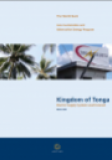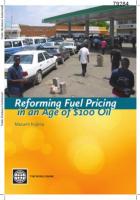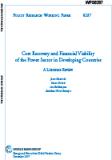Publications
Increases in world oil prices since 2004 have challenged consumers and oil-importing countries across the world. Oil prices temporarily fell sharply in 2009, only to triple three years later. The oil import share of gross domestic product rose by nearly half among net oil importers in just two years between 2009 and 2011. Governments that control oil product prices have come under pressure to intervene by keeping domestic prices low and effectively subsidizing consumers. This study focuses on the evolving role of oil in national economies, particularly those of developing countries, and proposes a menu of options for drawing a roadmap for pricing policy reform for oil products. In light of events since 2009, it examines how recent price movements have affected countries' vulnerability to world oil price increases, how governments have adjusted domestic fuel prices in response, the consequences of the policy responses, other coping mechanisms to deal with high oil prices and price volatility, the roadblocks to reforming pricing policy, and how to deal with them. This report suggests a menu of options for moving away from sectoral subsidies to market-based pricing, accompanied by an integrated social protection program and complementary policies to reduce consumption through efficiency improvement and fuel diversification. Sending the right price signals and reducing consumption can bring many benefits, ranging from greater supply security to less congestion and pollution from road transport. This report can help policy makers conduct more informed national dialogues on managing fuel pricing and the political economy around it.
Kojima, Masami. 2013. Reforming Fuel Pricing in an Age of $100 Oil. World Bank, Washington, DC. © World Bank. License: CC BY 3.0 IGO. https://openknowledge.worldbank.org/handle/10986/16524



